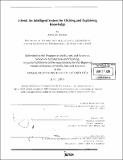i-Seek : an intelligent system for eliciting and explaining knowledge
Author(s)
Kumar, Ashwani, S.M. Massachusetts Institute of Technology
DownloadFull printable version (8.748Mb)
Alternative title
Intelligent system for eliciting and explaining knowledge
Other Contributors
Massachusetts Institute of Technology. Dept. of Architecture. Program In Media Arts and Sciences
Advisor
Henry Lieberman.
Terms of use
Metadata
Show full item recordAbstract
We propose i-Seek, an Intelligent System for Eliciting and Explaining Knowledge that leverages the OpenMind [1] Commonsense knowledge base in conjunction with domain- specific knowledge in Personal Finance, Technical Help, and Health domains to act as an advisory system for novice users. Most of the interfaces are plagued by recurrent key problems: 1) elicitation - how to ask questions that enable the expert model to make decisions, and at the same time, are understandable to the novice, and 2) explanation - how to explain rationale behind expert decisions in terms that the user can understand. i- Seek maps the user's goals and expectations to the corresponding expert model's attributes as expressed in domain-specific terms. For example, instead of asking "What is your risk tolerance?", where the user might not comprehend the notion of risk tolerance, i-Seek tries to elicit the same information by asking a non-direct question such as "Do you usually buy lots of lottery tickets?". i-Seek constructs the novice user model by taking into account the user's personal information, interactions history, and the current context.
Description
Thesis (S.M.)--Massachusetts Institute of Technology, School of Architecture and Planning, Program in Media Arts and Sciences, 2005. Includes bibliographical references (leaves 97-100).
Date issued
2005Department
Program in Media Arts and Sciences (Massachusetts Institute of Technology)Publisher
Massachusetts Institute of Technology
Keywords
Architecture. Program In Media Arts and Sciences